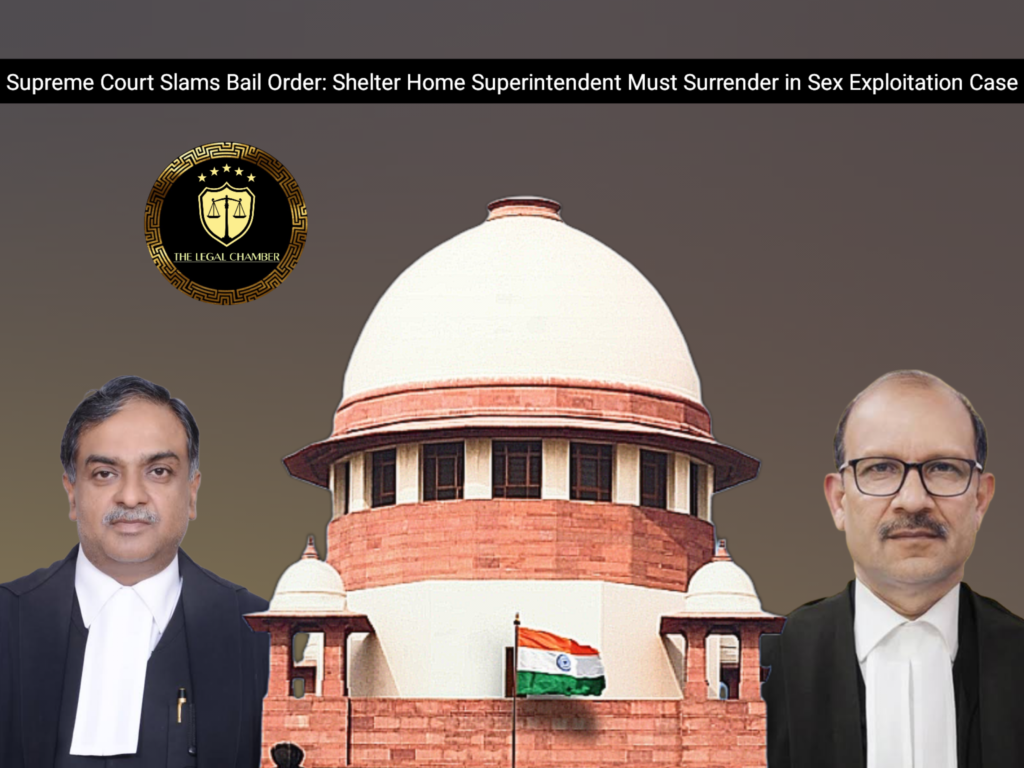
The Supreme Court cancelled the bail granted to the accused-respondent, holding that the High Court’s order was cryptic and violated Section 15A(3) of the SC/ST Act by not hearing the victim. The Court emphasized the gravity of the offences, the accused’s influence, and the risk of witness tampering, underscoring the need for reasoned bail orders in serious crimes. The judgment reaffirmed the principles laid down in Shabeen Ahmad and Ajwar, highlighting that bail in heinous offences must consider societal impact and trial integrity. The accused was directed to surrender, with protections ensured for the victims.
Facts Of The Case:
The case involves an appeal by Victim ‘X’ against the order of the Patna High Court granting bail to Respondent No. 2, the former Superintendent of a women’s protection home in Bihar. The accused was charged under Sections 341, 323, 328, 376, 120-B/34 of the IPC, Sections 3/4 of the Immoral Traffic (Prevention) Act, and Sections 3(1)(w)/3(2)(va) of the SC/ST Act. The allegations revealed that she administered intoxicants to female inmates, facilitated their sexual exploitation by influential individuals, and subjected them to mental torture. The FIR was registered based on a newspaper report, and the investigation was monitored by the High Court. The Special Court initially denied bail, but the High Court overturned this decision, granting bail without hearing the victim, in violation of Section 15A(3) of the SC/ST Act. The Supreme Court noted the accused’s reinstatement as Superintendent of another protection home, highlighting her influence and the risk to witnesses. Citing precedents like Shabeen Ahmad and Ajwar, the Court emphasized the gravity of the offences and the need for reasoned bail orders in serious crimes. It cancelled the bail, directing the accused to surrender and ensuring victim protection, while allowing her to seek bail under changed circumstances.
Procedural History:
The procedural history of the case begins with the registration of FIR No. 17 of 2022 at Mahila Police Station, Patna, against Respondent No. 2, the Superintendent of a women’s protection home, for offences under the IPC, Immoral Traffic (Prevention) Act, and SC/ST Act. The Special Court (SC/ST Act), Patna, rejected her bail application on 10th July 2023. Respondent No. 2 then filed an appeal under Section 14(A)(2) of the SC/ST Act before the Patna High Court, which granted bail on 18th January 2024 without hearing the victim, violating Section 15A(3) of the SC/ST Act. The victim, aggrieved by this order, approached the Supreme Court through a special leave petition (SLP (Crl.) No. 4335 of 2024). The Supreme Court, after hearing the parties, quashed the High Court’s bail order on 21st July 2025, citing its cryptic nature, non-compliance with statutory mandates, and the gravity of the offences. The Court directed the accused to surrender within four weeks and emphasized the need for victim protection and a fair trial. The judgment reinforced precedents on bail considerations in serious crimes.
READ ALSO:Supreme Court Quashes FIR in Land Dispute : Civil Dispute or Criminal Case?
Court Observation:
The Supreme Court made several critical observations while setting aside the bail granted strongly condemned the High Court’s cryptic and unreasoned bail order, which failed to consider the gravity of offences involving sexual exploitation, abuse of authority, and violation of SC/ST Act provisions. The Court emphasized that the High Court committed a serious procedural lapse by not hearing the victim as mandated under Section 15A(3) of the SC/ST Act, thereby depriving her of statutory rights.The Bench noted with concern the accused’s reinstatement as Superintendent of another protection home despite facing grave charges, observing that this reflected her influence over the administration and posed a clear threat to witnesses and the trial’s fairness. Relying on precedents like Shabeen Ahmad and Ajwar, the Court reiterated that bail in heinous crimes must be decided after evaluating factors such as the nature of accusations, likelihood of witness tampering, and societal impact. It held that the High Court’s order, being mechanical and ignoring material evidence, resulted in a travesty of justice.The Court underscored that bail cancellation was warranted not only due to procedural violations but also because the accused’s release endangered vulnerable victims and undermined public trust in the judiciary’s ability to protect marginalized sections. It directed the trial court to ensure witness protection and allowed the accused to seek fresh bail only if circumstances changed materially.
Final Decision & Judgement:
The Supreme Court allowed the appeal and set aside the High Court’s bail order, holding that the grant of bail to Respondent No. 2 was legally unsustainable. The Court cancelled the bail primarily on three grounds: (1) the High Court’s failure to give reasons for granting bail in a serious case involving heinous offences under the SC/ST Act and IPC; (2) violation of the mandatory requirement under Section 15A(3) of the SC/ST Act by not hearing the victim; and (3) the grave risk of witness tampering and obstruction of justice given the accused’s influential position and reinstatement in a similar official capacity. The Court directed Respondent No. 2 to surrender within four weeks, failing which the trial court was ordered to take her into custody. While emphasizing the need for victim protection and fair trial safeguards, the judgment clarified that this order wouldn’t preclude the accused from seeking bail afresh before the appropriate forum if circumstances changed materially. The decision reinforced the judiciary’s duty to apply heightened scrutiny in bail matters concerning serious crimes against vulnerable sections of society.
Case Details:
Case Title: Victim 'X' v. State of Bihar & Anr. Citation: (2025) INSC 877 Criminal Appeal No.: (Arising out of SLP (Crl.) No. 4335 of 2024) Date of Judgment: July 21, 2025 Judges/Justice Name: Justice Vikram Nath & Justice Sandeep Mehta
Download The Judgement Here